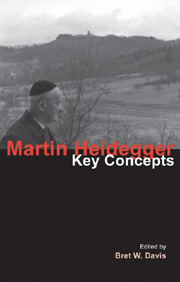Book contents
- Frontmatter
- Contents
- Contributors
- Acknowledgements
- Abbreviations
- Introduction: key concepts in Heidegger's thinking of being
- 1 Hermeneutics of facticity
- 2 Phenomenology: Heidegger after Husserl and the Greeks
- 3 Dasein as being-in-the-world
- 4 Care and authenticity
- 5 Being and time
- 6 The turn
- 7 Heidegger, National Socialism and the German People
- 8 Truth as alētheia and the clearing of beyng
- 9 The work of art
- 10 Ereignis: the event of appropriation
- 11 The history of being
- 12 Will and Gelassenheit
- 13 Ge-stell: enframing as the essence of technology
- 14 Language and poetry
- 15 The fourfold
- 16 Ontotheology and the question of god(s)
- 17 Heidegger on Christianity and divinity: a chronological compendium
- Chronology of Heidegger's life
- Bibliography
- Index
16 - Ontotheology and the question of god(s)
- Frontmatter
- Contents
- Contributors
- Acknowledgements
- Abbreviations
- Introduction: key concepts in Heidegger's thinking of being
- 1 Hermeneutics of facticity
- 2 Phenomenology: Heidegger after Husserl and the Greeks
- 3 Dasein as being-in-the-world
- 4 Care and authenticity
- 5 Being and time
- 6 The turn
- 7 Heidegger, National Socialism and the German People
- 8 Truth as alētheia and the clearing of beyng
- 9 The work of art
- 10 Ereignis: the event of appropriation
- 11 The history of being
- 12 Will and Gelassenheit
- 13 Ge-stell: enframing as the essence of technology
- 14 Language and poetry
- 15 The fourfold
- 16 Ontotheology and the question of god(s)
- 17 Heidegger on Christianity and divinity: a chronological compendium
- Chronology of Heidegger's life
- Bibliography
- Index
Summary
Heidegger's pious origins and his break with Catholic theology
If one wants to understand Heidegger's criticism of “ontotheology” and his thinking about God and the gods, it is important to begin by going back to the young Heidegger and the Christian environment from which he came. An ongoing relationship with theology, faith, the Church and Christianity runs like a thread through Heidegger's life (see Chapter 17). Heidegger was born, so to speak, in the Church. His father was a sexton, living in a house situated next to the church. When he was a young child and schoolboy, the church was always the backdrop for his play. As a young student, Heidegger's intellectual pursuits were inspired by his interest in theology. The relationship that Heidegger maintained with faith, theology and the Church throughout the whole of his work can surely be traced back to this early influence. Heidegger later provided a sketch of this world of his youth in the essay “Vom Geheimnis des Glockenturms” (GA 13: 113–16). Throughout his life, he states, the peal of the clock tower of St Martin's Church in Messkirch resounded, a ringing that bears witness to the divine rhythm in which holy days interweave with the course of the hours of the day and year. It is the eternal rhythm that orders daily life.
Despite having giving up his studies in theology in 1911, Heidegger continued to attend the lecture course of one of his professors (Carl Braig) on dogmatic theology (TB 74 = ZSD 81).
- Type
- Chapter
- Information
- Martin HeideggerKey Concepts, pp. 219 - 230Publisher: Acumen PublishingPrint publication year: 2009



